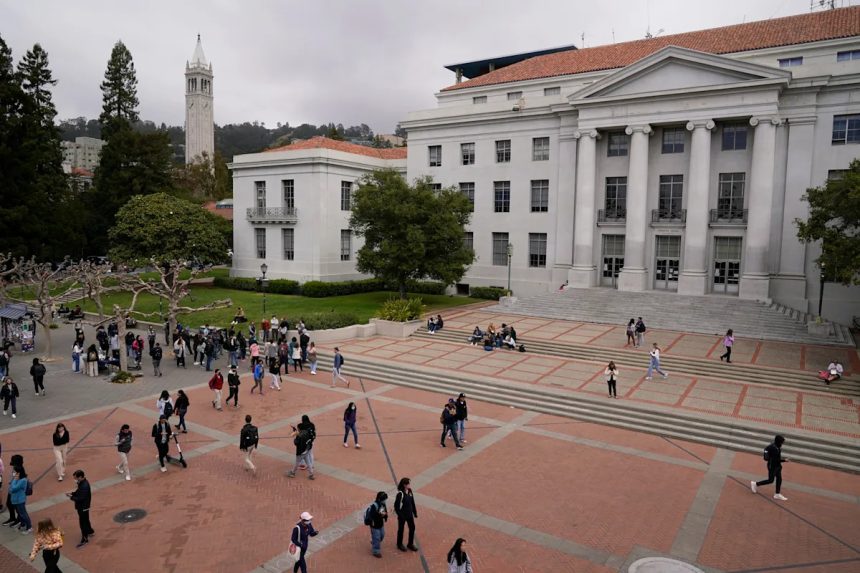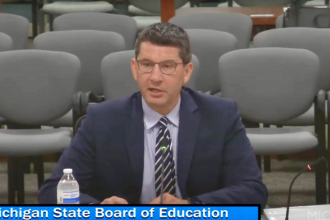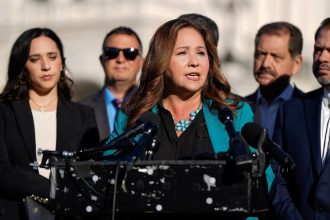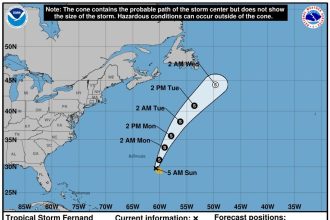SAN FRANCISCO — UC Berkeley faced continued backlash Tuesday for its decision to disclose the names of 160 students, faculty and staff to Trump administration officials as part of an investigation into allegations the school fostered an atmosphere of antisemitism.
The disclosure of the names comes as the federal government continues to wage a campaign to upend elite institutions of higher education that it launched in the wake of campus protests over Israel’s war against Hamas. Among the schools in its crosshairs are UC campuses at Berkeley, San Francisco and Los Angeles. At UCLA, Trump officials have withheld more than $580 million in research funds and offered to release the money if the school pays $1 billion.
Six hundred university professors from around the world who have worked with faculty at Berkeley signed onto an open letter Tuesday addressed to UC President James Milliken and UC Berkeley Chancellor Richard Lyons stating they were “truly concerned” about the decision to share the names. The professors, while acknowledging Berkeley has an obligation to comply with federal investigations, criticized how those whose names were shared “have not had a chance to dispute the information the university has collected.”
“Whatever reason UC Berkeley might have for acquiescing in federal investigations instead of refusing to comply, it goes against the principle of transparency to notify people that their names have been forwarded to the administration without communicating the content and nature of the allegations to the persons thus exposed,” the letter stated.
State Sen. Sasha Renée Pérez, a Democrat from Los Angeles who chairs the Senate Education Committee, told POLITICO she had a “productive” discussion with Lyons on Tuesday after stating the day before she was in “disbelief” learning about the disclosures.
Pérez said she learned in the meeting that the names were included in the voluminous documents Berkeley has handed over in an effort to cooperate with the federal investigation. The university, she said Lyons explained, chose to contact faculty and students who were included in the records “as a precaution” after the Trump administration demanded that names in documents not be redacted.
The university, Pérez said, “has not provided a list of targeted faculty and students.”
“We’re continuing to monitor this situation closely as we anticipate similar threats from the federal government on college campuses,” Pérez said. “These demands on our universities are pressure tactics by the federal government that instill fear and undermine trust in our academic institutions.”
In a statement, a UC Berkeley spokesperson said the university was directed by Milliken’s office to provide documents in response to the U.S. Department of Education’s Office of Civil Rights demand for records as part of its inquiry into how the university “handles complaints involving alleged incidents of antisemitism and/or discrimination.”
The documents were sent over a period of multiple months and people whose names were included were notified earlier this month. The spokesperson said the decision to alert the people was based on guidance from the school’s academic senate and “concerns from students that individuals be notified if their information is related to the federal government.”
Judith Butler, a professor in the Comparative Literature and Critical Theory department who said they were notified by Berkeley that their name was included in documents sent to Washington, raised the notion that other UC schools had done the same, but had not alerted people.
“It could be a thousand,” Butler said in an interview with Democracy Nowof the number of names given by UC schools to investigators. “It could be more than a thousand. It’s 160 at UC Berkeley. What is it at UCLA? I don’t know.”
Butler, who declined to comment to POLITICO, has not said what evidence they have to support their claim.
The UC Office of the President declined to respond to Butler’s allegation, pointing to a prior statement by Charles Robinson, the UC’s general counsel and senior vice president for legal affairs that said the UC “will continue to meet its legal obligations while exploring all legal avenues to safeguard the privacy and trust of our community members.” Robinson said the UC has previously complied with investigative requests “consistently over many years and across numerous administrations.”
A spokesperson for Gov. Gavin Newsom, who has strongly pushed for the UC not to give into Trump’s demands, did not directly address the decision to share names and information on individuals, but stated: “Trump — the guy who broke bread with the neo-nazi Nick Fuentes — has weaponized the Department of Justice to punish California, crush free thinking, and kneecap the greatest public university system in the world.”
Such comments and the university’s defense of its decision did little to assuage labor leaders and faculty members outside UCSF prior to a meeting of the UC Board of Regents Tuesday afternoon.
“I think that’s right in line with intimidation, and an institution that’s choosing to kind of comply,” said Kathryn Lybarger, executive vice president at AFSCME Local 3299 — the UC’s largest employee union — following a rally.
Earlier on Tuesday, AFSCME joined with the American Association of University Professors and several other unions in suing the Trump administration over allegations it has used civil rights laws to exert control over the UC system.
The Berkeley Faculty Association on Monday also sent a letter to Lyons stating that the name disclosures have caused its members “significant harm, including chilled speech and association and, among non-citizens, heightened fear of detention and deportation.”
The association argued the university would have been on solid legal footing refusing to acquiesce to the records demand because a civil rights investigation focuses on whether the university itself is in compliance with civil rights laws rather than whether students, faculty or staff have committed violations.
Zoé Hamstead, co-chair at the UC Berkeley Faculty Association, said that the university divulging the information is especially concerning for students who are not citizens given the administration’s crackdown on undocumented immigrants.
“There’s definitely a sense of fear and a sense of distrust,” Hamstead said. “There are a lot of questions about why the university would disclose this information that isn’t required in the course of such an investigation.”









